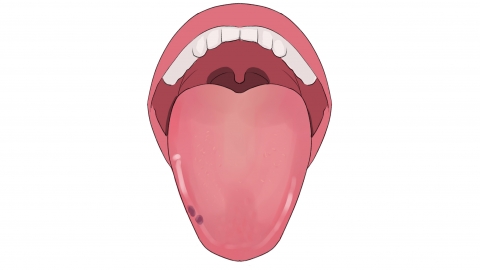Which department should I visit for scalloped tongue?
For scalloped tongue, one may generally choose departments such as dentistry, traditional Chinese medicine (TCM) internal medicine, gastroenterology, endocrinology, or pediatrics. If the scalloped tongue is accompanied by significant pain, taste disturbances, or fails to improve over time, prompt medical consultation is recommended.

1. **Dentistry**: If the scalloped tongue is associated with tongue swelling, pain, or mucosal damage, or if it's suspected to be related to abnormal tooth occlusion or oral inflammation, a dentist can examine the oral structure and condition of the tongue mucosa to identify and treat local lesions.
2. **TCM Internal Medicine**: In traditional Chinese medicine, scalloped tongue is often considered related to spleen deficiency with excessive dampness or insufficiency of qi and blood. If accompanied by thick greasy tongue coating, abdominal distension, or fatigue, TCM internal medicine can apply pattern differentiation and treatment using herbal remedies to regulate body constitution and improve tongue appearance.
3. **Gastroenterology**: If the scalloped tongue occurs alongside gastrointestinal symptoms such as bloating, diarrhea, acid reflux, or poor appetite, it may be linked to gastrointestinal dysfunction or indigestion. Gastroenterologists can perform examinations to identify underlying digestive issues and provide targeted treatments.
4. **Endocrinology**: When scalloped tongue is accompanied by symptoms like unexplained weight changes, excessive thirst, frequent urination, or fatigue, it may indicate endocrine disorders such as thyroid dysfunction or diabetes. The endocrinology department can test hormone levels and screen for related diseases.
5. **Pediatrics**: In children presenting with scalloped tongue along with picky eating, pallor, poor weight gain, or delayed growth and development, the cause may involve nutritional imbalance or weak spleen and stomach function. Pediatricians can develop nutritional guidance and treatment plans tailored to children's physiological characteristics.
Daily care includes maintaining good oral hygiene, rinsing the mouth with warm water after meals, avoiding chronic sleep deprivation, eating a balanced diet rich in spleen- and stomach-nourishing foods, reducing intake of spicy and greasy foods, and engaging in moderate physical activity to strengthen overall health.








